| ||
| ||
from Good Housekeeping
Laughing Philosophers
by Arthur GuitermanAbraham Lincoln was in many respects a typical American humorist, for he had his share of the grim humor which enabled the early pioneers to jest with difficulty, death and danger; he had yet more of the gentle humor that flows from a sweet nature with generous sympathies -- the humor that loves that which it jests upon -- and he had as much of the shrewd, philosophic humor, born of clear-eyed sanity and sense of proportion, which enabled him, by ludicrous analogies, to present puzzling problems in their true light, to dispel the mists of prejudice, and to end quarrels with mutual laughter.
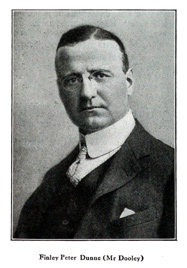
Mr. Dooley -- for nobody ever thinks of him as Finley Peter Dunne -- occupies an exalted seat in the School of Laughing Philosophers. For ten years and more he has discoursed to his countrymen on peace, war, society, politics, literature, home life, cabbages and kings, and his preachments have been received with joy wherever English or near-English is spoken.
The good humor and tact inherited from a long line of Irish kings somehow enables Mr. Dooley to deal freely with mooted questions without stirring anyone's angry passions. He has a knack of presenting both sides of a case and leaving his audience to decide for themselves, thus completely disarming or muzzling dogmatism. Discussing the rights and privileges of woman in Observations by Mr. Dooley, the tactful sage avoids controversial ground by the rhetorical question,
"What does a woman want iv rights whin she has priv'leges? . . .
"They haven't th' right to vote, but they have th' priv'lege iv conthrollin' th' man ye ilict. They haven't th' right to make laws, but they have th' priv'lege iv breakin' thim, which is betther. They haven't th' right iv a fair thrile be a jury iv their peers, but they have th' priv'lege iv an unfair thrile be a jury iv their admirin' infeeryors."
"If I cud fly, d'ye think I'd want to walk?"
Well, Mr. Dooley, unlike Mr. Dunne, is a bachelor.
Mr. Dunne was born in Chicago in 1867. After wide experience in newspaper work in that city he came to New York, where he is very busy helping to edit the American Magazine and transcribing further oracles of Martin Dooley.
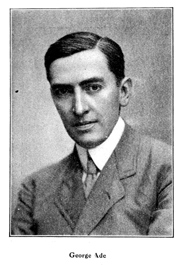
Until George Ade started to play havoc with the language of Shakespeare and others in his Fables, no one fully realized the possibilities of slang as a medium for expressing the American idea. His philosophy has concerned itself chiefly with our variegated social life, and the title of one of his books, People You Know, expresses the true inwardness of his work before he fell from grace and became a playwright. Here is a typical piece of portraiture from True Bills, the subject being a traveling salesman possessed with the fatal gift of beauty:
"Whenever he unpacked at a Hotel he put a Photograph of Himself out on the Dresser so as to make the Room more cheerful.
"He hated to turn out the Light at Night and have all his Good Looks go to waste for Hours at a Stretch.
"When Clarence hail polished up his Rings and Stud with a Piece of Chamois and got into his Sack Suit with the up-and-down Stripe and put on his nobby white Hat with the black Band, you may think that he despised himself, but he did not. It was like breaking Home Ties for him to say good-by to a Mirror."
As everybody knows, George Ade was born in Indiana -- Kentland, to be accurate -- in 1866, took a post-graduate course in slang while engaged in newspaper work in Chicago, and now divides his time between farming in his native state and staging his increasing family of plays in New York.
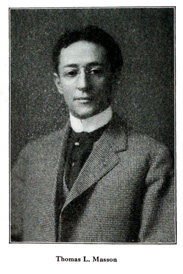
Readers of Tom Masson's charming little stories, light essays and graceful verse, would hardly suspect the author of being a constant student of the philosophy of Kant, Schopenhauer and Plato; yet a philosopher Mr. Masson certainly is, and the depth of his philosophy is proven by this gem from his recent volume, A Corner in Women:
"Motto for a Married Man.
"Be sure you are right, then keep it to yourself."
Mr. Masson has been a married man these fourteen years and more. Yet that be is far from being a cynical married man is shown by the graceful dedication of the volume referred to:
"This book is dedicated to three friends:
"To Cupid, who came to stay with me.
"To the Wolf, who sniffed at my door and honored me with his absence.
"And to the Stork, who brought me what I most desired."
Mr. Masson was born in Essex, Connecticut, in 1866. He has had a wide and varied experience as a traveler, business man and newspaper writer, and since 1893 has been the editor of Life.
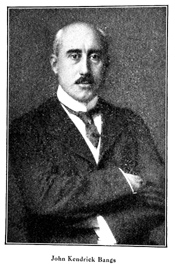
On the coast of Maine, fifteen miles north of Portsmouth, New Hampshire, John Kendrick Bangs is working and playing in accordance with a philosophy of life that is best expressed in his own verse:
The Word
Today, whatever may annoy,
The word for me is Joy, just simple Joy:
The joy of life;
The joy of children and of wife;
The joy of bright blue skies;
The joy of rain; the glad surprise
Of twinkling stars that shine at night;
The joy of winged things upon their flight;
The joy of noonday, and the tried
True joyousness of eventide;
The joy of labor, and of mirth;
The joy of air, and sea, and earth --
The countless joys that ever flow from him
Whose vast beneficence doth dim
The lustrous light, of day,
And lavish gifts divine upon our way.
Whate'er there be of Sorrow
I'll put off till Tomorrow,
And when Tomorrow comes, why then
'Twill be Today and Joy again!It is useless to try to summarize the qualities of an author of twenty-eight diversified books, but everyone has met some of Mr. Bangs's quaint ghosts, amusing mortals and transcendental inventions. Mr. Bangs was born in 1862 in Yonkers, New York, and is not old enough to have outgrown his early ambition "to do his best work all the time and to make today's effort better than yesterday's."
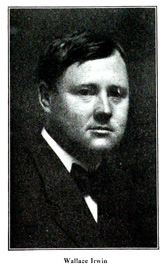
If he had no other claim to distinction it would be sufficient that Hashimura Togo, known to the police as Wallace Irwin, has demonstrated while turning out Rubaiyats, love sonnets of car conductors and the like, that financial success may be achieved by writing verse.
Anybody can do it if only he has the facility, wit and fertile invention which some good fairy up in Oneida, New York, gave Mr. Irwin thirty-three years ago. Although his pen has been very busy, both in California and New York, ever since he left Leland Stanford University, Mr. Irwin began writing prose by way of variety only two years ago. In his letters of a Japanese Schoolboy in Collier's Weekly , Mr. Irwin, as Hashimura Togo, has created a new form of humorous literature adorned "with gorgeous exotic flowers of Japanese English culled in California gardens.
Here is one of Mr. Hashimura's lyrics, peculiarly suited to the season. It expresses (perhaps) Mr. Irwin's philosophy of life:
"If Grasshop Bugs was merely scarce to see
And human persons was not used to its
Remarkabilious ways, all world might be
Admiring of his limbs the way they fits."But Grasshop Bugs has got around so thick
That persons sweep them up in pans and pails,
And Poets, while them lovelus Grasshops kick,
Are somewheres else admiring Nightingales."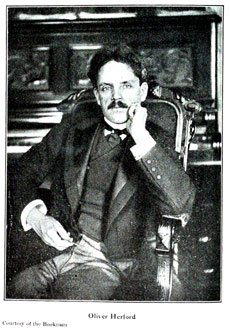
In his American Anthology, Edmund Clarence Stedman hinted, though with an interrogation point, his belief that Oliver Herford was born in Fairyland. But while much of his work bears out that idea, Mr. Herford himself has an impression that his birthplace is in Sheffield, England; but as for his axe, that changes with the weather, and he has decided to forget the day and mouth because of an aversion to birthday gifts. But this does not prevent Mr. Herford from producing graceful drawings, and embodying the quaintest conceits in verses of flawless workmanship. Mr. Herford himself would never choose this little parody of Herrick's "Gather ye rosebuds," as representative of his work, but it is quoted on the guess that it comes near to expressing his philosophy:
"Gather Kittens while you may,
Time brings only sorrow;
And the Kittens of today
Will be Old Cats tomorrow."That Mr. Herford is an expert in zoology, everyone who has seen his Child's Primer of Natural History will be ready to testify; his insight into the newer science of seismology is shown by his observations on "The Bashful Earthquake;" and his forthcoming work, The Simple Jography, will teach the geographical societies several things they did not know before.
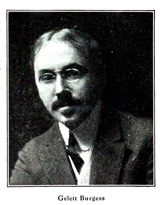
Does anyone doubt that Gelett Burgess, he of the equally ready pen and pencil, is an adept in philosophy? Read his famous essay, Are You a Bromide? and be convinced that he is a social philosopher of great analytic power. Peruse his dissertations on the nature and characteristics of "Goops" and know him as a moral philosopher of a most practical bent. Chant his touching lyric on the "Purple Cow" -- but no! Mr. Burgess has threatened dire penalties for any further repetition of that masterpiece, so let us be satisfied with quoting this contribution to the philosophy of content:
"I'd rather have fingers than toes;
I'd rather have eyes than a nose;
And as for my hair,
I'm glad it's all there --
I'll be awfully sad when it goes."Having been born in Boston, in 1866, Mr. Burgess comes honestly by his philosophical tendencies, though these have, perhaps, been somewhat modified by residence in California.
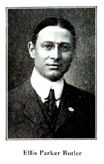
In 1869 Ellis Parker Butler had the advantage of being born in Muscatine, Iowa, where, presumably, he first made the acquaintance of Eliph' Hewlitt, the book agent who is so wadded to his profession that he simply can't help selling "Jarby's Encyclopedia of Knowledge and Compendium of Literature and Art" to all comers. Since then Mr. Butler has perfected his knowledge of book agents, pigs, pies and other commodities as an editor in New York and as a suburbanite in Flushing.
Mr. Butler's humor is of the rare sort that depends not on verbal quirks or funny speeches, but on amusing situations and skillful delineations of normal characters. Even the express agent in Pigs Is Pigs, who learns to his sorrow that the guinea pig is a totally different proposition from the common or garden pig, is a perfectly natural and representative express agent.
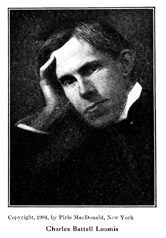
Presumably Charles Battell Loomis is at present chasing a tennis ball at his ancestral home in Torringford, Connecticut, occasionally pausing to write a book or so as a stepping stone toward what he frankly admits is his chief ambition -- to become America's pet humorist.
Mr. Loomis derived his sense of humor from a long line of colonial ancestors who learned to jest with their troubles. He was born in Brooklyn, New York, in 1861. It was only after an arduous business career of twelve years that in 1891 he burst into literature, but he has been making up for lost time ever since with tales of Yankee Enchantments, stories of good cheer, and Just Rhymes.
To appreciate Mr. Loomis's humor it is really necessary to hear him recite the story of "the loddy with the goold finger nails." Yet the spirit that animates him may be partly inferred from this extract from the preface to his recent book, Cheer Up:
"Cheer up. You may yet pass without a condition.
"Cheer up. She may accept if you ask her again.
"Cheer up. What if it was a girl? Isn't a good girl better than a bad boy?
"Cheer up. Diogenes would have found him at the capitol. I mean it.
"Cheer, up. Send it to another editor.
"Cheer up. He loves you still. That's the trouble.
"Be kind to the rich."
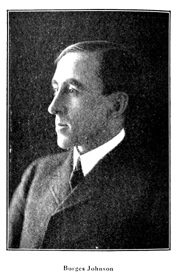
If at this present moment Burges Johnson isn't editing Judge or helping edit Leslie's Weekly , he is either digging clams at his home in Port Washington, Long Island, or romping with his family, which consists of one small, fairly white girl and one large, dark dog, both of whom have inherited a sense of humor transmitted from historic John Alden through many generations of Americans, mostly clergymen.
Mr. Johnson shows at his best in the tender humor of his poems of child life, and very likely you would prefer such little gems from Rhymes of Little Boys as "Bed-Time," or "Was You Ever Spanked?" But in sheer perversity the untitled epilog to the book is here set down:
"The Flea
Is wee
But, mercy me!
It's just as big as it can be.
If bigness was
As bigness does,
'Twould be as big as -- Dear me, Suz!"Mr. Johnson, by the way, is a Vermonter born and is only going on thirty-one.
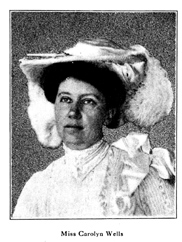
Carolyn Wells! -- hasn't someone remarked the significance of that name, so appropriately suggestive of babbling brooks, rippling lakes and other incarnations of sparkle, music and laughter? Miss Wells must be fairly in Europe by this time, so there is no danger in saying that no one today is writing vers de societe of more brightness and originality than hers. This is a very insufficient sample from Idle Idyls:
LEFT.
The sky is blue, the sea is bright
The waves are dancing with delight,
The earth is glad, my heart is gay,
Sweet Kitty Somers comes this way.The sky is dark, the sea is gray,
It is a gloomy, doleful day,
The earth is sad, and sad am I,
Miss Katharine Somers passed me by.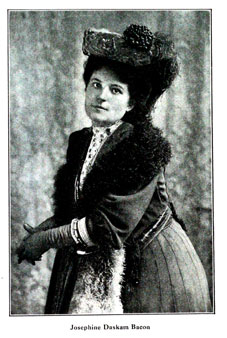
Josephine Daskam Bacon is perhaps best known for her stories of child life and her poems for children, so full of spontaneous fun, and showing so clearly that the writer has not lived long enough to forget how she herself thought and felt as a child. But Mrs. Bacon is also among the fabulists. There is much shrewd observation in her Fables for the Fair, notably in the tale of the woman who, not wishing to be thought uncomfortably intellectual, expressed a distaste for Ibsen and Maeterlinck, thereby winning her visitor's approval; but when she depreciated Shakespeare --
"'Nay, nay,' said the Man, 'this is Too Much. Not to understand Ibsen shows that you are a Good Woman; to think Maeterlinck silly augurs Well for your Intelligence, but not to see Much Sense in Shakespeare implies that you are Uneducated.'"
"And he did not Call Again."
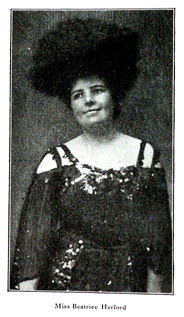
Beatrice Herford (Mrs. Sidney Willard Hayward), sister of Oliver Herford, is best known for her readings of her monologs humorously representing "The Shop Girl," "The Sociable Seamstress," "The Bazaar," and other familiar types and scenes. May Isabel Fisk has also won fame both at home and abroad as an interpreter of her own monologs, "The Talking Woman" and others humorous and dramatic.
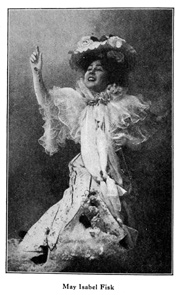
www.ellisparkerbutler.info
Saturday, October 07 at 1:48:09am USA Central